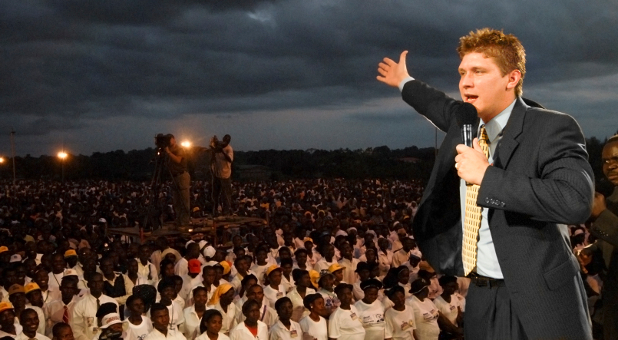Daniel Kolenda: Stop Being Fearful of God’s Will for Your Life
As a little boy raised in the church, I was often confused by the words of certain songs. For instance, whenever the song “Bringing in the Sheaves” was sung, I thought we were singing about bringing in the “sheeps.” I always wondered where we would get these “sheeps” and why we wanted to bring them in anyway. Spiritual themes, whether spoken or sung, can easily confuse the simple mind of a child; and while I learned quite early that “sheeps” is not even a word, the topic of God’s will continued to be a point of confusion for a long time.
I remember another song we used to sing, usually after a missionary had told depressing stories about the hardships and toils of the mission field: “Jesus, use me / Oh, Lord, don’t refuse me / Surely there’s a work that I must do / And even though it’s humble, help my will to crumble / Though the cost be great, I’ll work for You.”
As wonderful as those words are in and of themselves, there was something about the combination of the lyrics, the music and the context that made me afraid of God’s will for my life. I thought He must have something simply dreadful for me to do. I just knew He was going to send me deep into the jungle where I would live in a mud hut, survive on a diet of grubs and wind up being eaten by cannibals.
Looking back, my naïveté is quite amusing now, but the reality is that many people—ministry leaders included—really are afraid to discover God’s will for their lives, even if subconsciously.
They think: What if God wants me to do something I don’t want to do? What if God wants me to do something I’m not good at? What if doing God’s will means I have to give up my hopes and dreams? I think sometimes people haven’t discovered God’s will simply because they are afraid to.
God’s Will Fits You
After I preached at a certain Bible college one of the students approached me. He was nearing graduation and had been seeking God’s will for many years but still had no direction. He asked me, “How can I figure out what God wants me to do with my life?”
We were standing next to a lamp, and I noticed that it had been unplugged. I pointed to the plug lying on the ground and said to him: “How do you know what that three-pronged contraption is for? Should I stick it in my ear or use it to comb my hair?”
“Of course not,” he replied. “It goes into the electric socket.”
How did he know that? Because of its shape. That plug fit so perfectly into that electric socket that there was no question that it was made for it. Even a child who had never seen a plug or socket before could figure out that they were made for each other.
This is one way you can know what God wants from you. Where do you fit? What do you enjoy? What brings you delight and satisfaction?
I have heard people teach that God’s will is always difficult and requires great sacrifice. But I have seen that the most effective people in any ministry or occupation, or just life in general, are not the ones forcing themselves to do some dreadful task because they feel it is God’s will. Rather it is the ones who are doing something they enjoy so much that they feel guilty taking a salary for it.
When you find something that makes you want to jump out of bed in the morning, when you find something that challenges and thrills you, when you find something that you sense you were made to do, chances are you are getting close to discovering God’s will for your life.
This does not mean that obedience, death to self and sacrifice are never required or necessary. But when a person is doing what he or she was created to do, there is a taste of sweetness in the sacrifice, a sense of fulfillment in the obedience and an enduring hope in the suffering.
With Your Gift Comes His Gift
We often talk about the fivefold ministry gifts—apostle, prophet, pastor, teacher and evangelist—that are listed in Ephesians 4. But it is vital that we remember what it says in verse 7, “But to each one of us grace was given according to the measure of Christ’s gift.”
Grace comes with every gift! Jesus is the fullest expression of all of the five ministries, but when He ascended He distributed 20 percent of His ministry to the apostles, 20 percent to the prophets, 20 percent to the pastors, 20 percent to the teachers and 20 percent to the evangelists. Not only did He give the gifts, He also gave grace according to the measure of the gift.
Did you ever receive some special gift for your birthday as a kid, then after you had torn open the package you realized it needed batteries to operate? When Jesus gives a gift, He also gives the batteries the gift requires to operate. The battery for “the gift of Christ” is grace. But He will give you only the measure of grace you need for the gift He has given.
I hear a lot of preachers talking about “burnout” these days, and it doesn’t surprise me. Imagine a pure pastor who is wonderfully gifted in his pastoral office. He is using 100 percent of his God-given ministry gift, yet his gift is only 20 percent of what his congregation needs. This precious pastor is working around the clock, attempting to provide 100 percent of what the church requires to be perfected and edified in the way Ephesians 4:12 describes, yet he has only 20 percent of the grace to do that job!
Anyone can see that this is a formula for disaster. If a person’s body has only 20 percent functionality, we would say that person is handicapped. If an airplane lost all but 20 percent of its mechanical capabilities, the pilot would bring it in for an emergency landing. If a business operated at only 20 percent output, it would soon go bankrupt.
In Philippians 1, Paul is talking to his ministry partners (the ones who were supporting him financially). In verse 5 he expresses his gratitude for their partnership in the work of the gospel, and then says in verse 7, “Ye all are partakers of my grace” (KJV). Do you realize that you can actually tap into the grace that is on someone else’s life? By partnering with Paul’s gift, the Ephesians became partakers of the grace on his life!
Let’s go back to my example of the pastor who is burning out. Rather than attempting to provide 100 percent of his church’s needs with 20 percent of the gift and grace, he should partner with others who are gifted in the areas he is not. When he partners with their gift, he will also become a partaker in their grace, and the whole church will benefit.




























































